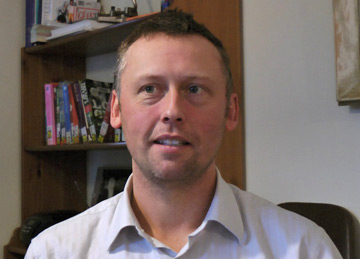Drew

Cares for his mother
Age at interview: 38
Age at start of caregiving: 5
Drew (38 years) is married and has four children (7 to 13 years). He cares for his mother who lives in a separate part of their family home. Drew works full-time as a businessman with his own company at home. Drew’s mother had a stroke (CVA) when he was five years old. He has been involved in her care since he was five years old, and has increasingly taken over the primary caregiver’s responsibilities from his grandparents. His mother needs 24/7care; this is organized through family care and paid caregivers.
Drew was four years old when his mother had a stroke and was hospitalized. After nine months, her parents decided to bring her home and care for her themselves. So Drew grew up in an environment where family caregiving is just something you did. He would be sent to his mother when she was anxious, as he was one of the only ones that could calm her down. Since then, he has always been actively involved in her care because he wanted to be involved. It progressed from offering respite whenever he could during his university years, to offering weekend and vacation respite for his grandparents, and eventually to becoming the primary caregiver when he married, soon after his grandfather passed away. He moved with his wife into the house where his mother and grandmother lived. One year later, he and his wife decided to start their own family and they moved with his mother to a new home. Now his caregiver role has changed from hands-on caregiving into being more of a back-up since he has arranged 24/7 care support for his mother.
Drew describes different crisis periods in their family caregiving, such as when his grandfather died, as well as a number of challenges: the lack of healthcare support with his mother’s changing needs; the balancing of family, career and caregiving; and his mother’s incontinence and loss of mobility due to a hip fracture. He feels that caregivers are resilient people; they roll up their sleeves, address each crisis and learn to cope. Drew says that anybody who considers becoming a caregiver ultimately has to have that inner sense of: ‘we can overcome the majority of obstacles that come our way’.
He indicates that he is not a good caregiver if he doesn’t have an adequate balance between caregiving and family life. He is available 24/7 for the care of his mother but also makes sure he doesn’t miss too many family activities or moments with his wife. Sometimes the balance is right; sometimes it tips too much to the other side and then needs readjustment.
One of his sisters has actively chosen not to be involved, and another has chosen to be involved as much as she can; Drew, the youngest, chose to become the primary caregiver. On a yearly basis, his family evaluates the situation and makes decisions about the best option for his mother; until now the choice has always been the family care option, partly because they have not yet found a better solution.
He would like to see some more recognition for family caregivers or support for accessing things such as respite services, especially because caregivers contribute to the public health system in a very material way.
More content
- When care changes over time – DrewDrew describes two critical points during the course of his mother’s disease when his family had to make significant adjustments.
- Uncovering how and why caregivers care – DrewDrew thinks caregivers need to feel they can overcome most obstacles.
- Trying to find the right balance 2 – DrewWhile working on finding the right balance, Drew’s most important objective is to make sure his mother has the best possible care.
- Trying to find the right balance – DrewDrew and his family have made many changes to keep the right balance over the years.
- The future and caregiving – Drew“The future is 5 minutes from now.” Drew wants to focus on making sure his mother receives the best care possible.
- Support from family and friends – DrewDrew’s siblings all had different reasons to be involved in the care or not.
- Society and caregiving – DrewDrew would like the healthcare system to recognize caregivers’ contributions.
- Navigating the system – DrewAccess is a two-way street. You have to want to reach out, and there has to be something to reach out to. Drew found that there is no single person or place that can meet your needs fully.
- Legal issues – DrewAs a legal guardian for his mother, Drew considers alternatives on a yearly basis to ensure she is receiving the best possible care.
- Hospitals and facilities – DrewHospital staff can make use of the knowledge caregivers have about their loved-ones, as in Drew’s case.